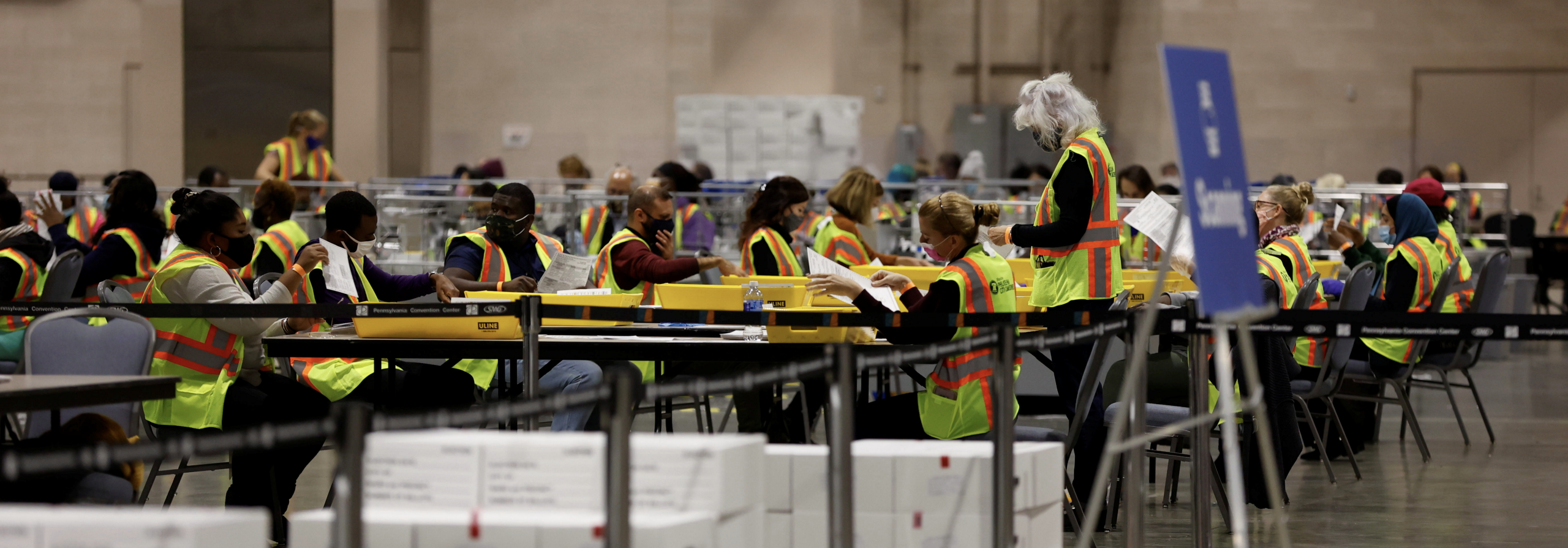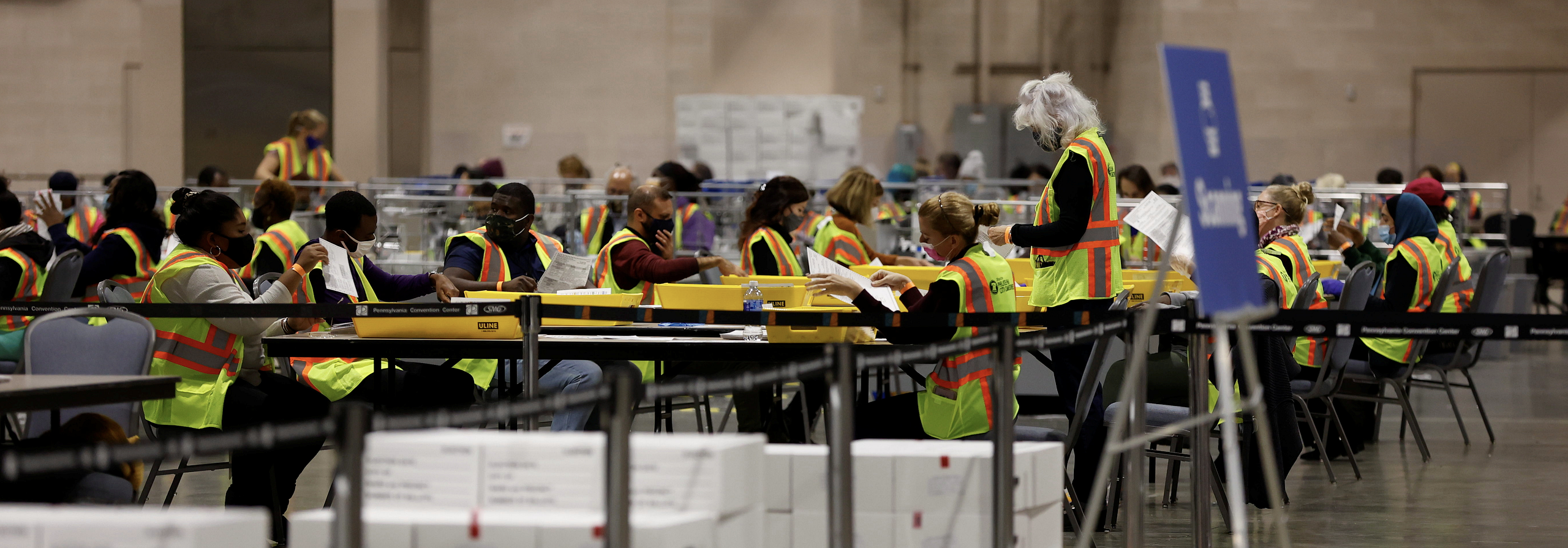Op-Ed: Baltic states offer insights into how to counter ongoing election disinfo
Foreign interference remains a concern as
Op-Ed: Baltic states offer insights into how to counter ongoing election disinfo

Foreign interference remains a concern as U.S. states work to certify vote tallies

As part of our effort to broaden expertise and understanding of information ecosystems around the world, the DFRLab is publishing this external contribution. The views and assessments in this open-source analysis do not necessarily represent those of the DFRLab.
The October 22, 2020 joint announcement by the FBI and the Cybersecurity and Infrastructure Security Agency that a Russian state-sponsored actor had targeted and extracted data from U.S. state and local governments caused a stir in Washington as evidence of Russia’s interests in interfering with the 2020 U.S. presidential election. For Russia’s neighbors, Estonia, Latvia, and Lithuania, this kind of revelation remains a part of everyday life — and par for the course for an election cycle. Their experience offers a hint at how go about resisting potential foreign interference in future elections.
The Russian-linked “Ghostrider” disinformation campaign, for example, employed digital propogandists to plant fake stories critical of NATO and U.S. troops in the Baltics, then rapidly promoted them through fake social media channels. Campaigns like this can be spotted by tools from governments such as Lithuania. The ability to call out information operations clearly is a real power that as of late the U.S. federal government has reserved for only a handful of occasions, and lately focused on China and Iran more than Russia.
Research on Russian electoral interference, published by Harvard’s Belfer Center for Science and International Affairs, includes lessons learned for the U.S. that may help as states continue the process of certifying the final vote count. As part of the Soviet Union, Estonians, Latvians, and Lithuania’s encountered Russian propaganda everywhere — but especially in media campaigns. During the 2020 election cycle, the American public became uniquely vulnerable to domestic disinformation campaigns about the fidelity of the election. This vulnerability could still be used by foreign actors to exacerbate existing domestic tensions in the U.S. to fuel distrust in electoral processes. Imagine Bush v. Gore with fake news of ballot tampering and fraud pumped out by illegitimate social media profiles, and that just scratches the surface of what the highly partisan digital landscape could cause in terms of post-electoral chaos.
For example, in the 2019 parliamentary election in Estonia, Russian state media and social media networks jumped on spreading the news story of posters put up by Eesti 200, a minor liberal party, that said in Estonian “Only Estonians here” and “Only Russians here” at a busy tram stop in the capital city of Tallinn. Though Eesti 200 is not represented in any of the 101 seats of the Estonian parliament, Russian state-run media treated the episode as evidence of a plot to create an Estonian “apartheid” state.
The Baltic states are three European democracies that have a history of running successful elections despite covert Russian electoral interference during their elections. Key qualities, gleaned from research and more than 45 interviews with government officials and analysts, of the voting publics in Baltic states include a critical eye toward late-in-the-game campaigning (Latvia’s has a prohibition on candidate advertising 30 days before the election); their commitment to traceability of ballots (Estonia verifying vote tallies on their electronic voting or e-voting system); and a healthy dose of skepticism toward stories that fit the classic Russian propaganda playbook (Lithuania’s efforts to notify NATO members about Russian covert operations).
But rather than a hindrance, the Baltic states’ long experience with Soviet and now Russian propaganda led to a greater degree of societal alertness against a crisis of disinformation. As one Latvian expert on disinformation told us, “We can’t call what we have true resilience. What we have here is a reflex.”
For the most part, Russian methods, whether in the Baltic states or elsewhere, exacerbate existing narratives that may be a part of domestic disinformation efforts, rather than trying to create new divisions overnight. By altering the information ecosystem to change how a target population thinks and acts, Russia can achieve its larger foreign policy goals. As the vote counts are finalized, Russia will look for ways in which to manipulate the information voters receive, injecting disinformation and propaganda into the media ecosystem in order to, in the words of Putting adviser Vladislav Surkov, “interfere in your brains and change your conscience.” The classic playbook would include efforts to undermine the integrity of the election by putting into doubt the result. As the U.S. Intelligence Community reported in the 2016 election when It appeared Democratic nominee Hillary Clinton could win, tactics changed to focus more on undermining a future administration. The same may be true for during the current period of state-by-state ballot certification.
An effective response to this, particularly for future election cycles, includes moving the U.S. public from merely being aware of Russian efforts to being alerted to how they can stop the spread of domestic or foreign disinformation as ballots are counted. The Estonian government, for its part, requires a 35-hour media and manipulation class for all high schoolers, and deploys a citizen-soldier cyber reserve corps to protect critical networks from outside interference. Latvia relies on paper ballots as a back-up and contingency planning in case electricity is cut at polling sites. Lithuania regularly hosts table-top style exercises among leaders to simulate Russian cyber attacks or disinformation campaigns.
One particular strength of the U.S. electoral system is that its elections are administered at the state level, requiring would-be foreign actors to commit to an expensive and sophisticated campaign to penetrate secure networks to change vote tallies in key states. The fear, then, is not that vote tallies are not counted properly, but that ongoing domestic disinformation about the election result between now and inauguration day could be exacerbated by foreign actors who do not have the best interests of the U.S. at heart.
Andrew J. Swab (@ajswab) is a cyber risk consultant.
Follow along for more in-depth analysis from our #DigitalSherlocks.

